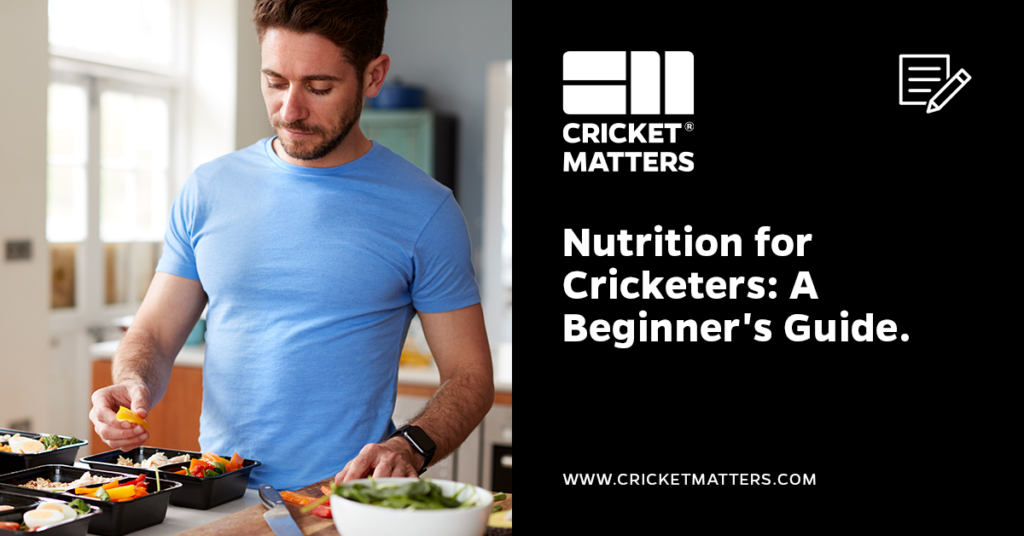
I hope you enjoy reading this blog post.
James Breese, Cricket Matters FounderIf you need my help with your cricket fitness, rehab, or nutrition needs, click here.
What should cricketers eat and drink on match days?
We know from experience that proper nutrition is essential for cricketers to perform their best on match days.
It’s been proven in Baseball and a host of other sports that better nutrition and recovery practices significantly enhance player performance.
This means cricketers, too, can benefit from strategic eating and drinking.
This article will dive into the optimal diet for cricketers on match days.
We will explore the importance of nutrition and provide guidelines for pre-match meals, hydration strategies, in-match snacks, and post-match recovery foods.
Let’s dive in.
Table of Contents
The Role of Nutrition in Cricket

For elite athletic performance, nutrition is crucial beyond simply fueling the body.
The right nutritional strategies can make the difference between winning and losing for athletes, especially on match days.
Understanding how specific nutrients impact energy levels, endurance, muscle function, and overall performance is essential for cricketers wanting to perform at their best.
Here are the fundamental ways nutrition influences athletic performance on match days, ensuring cricketers are well-prepared to give their all when it matters most.
- Energy Levels: Proper nutrition ensures adequate glycogen stores in muscles and liver, providing sustained energy throughout the game.
- Endurance: Carbohydrate-rich diets enhance endurance, allowing athletes to perform at high intensity for longer.
- Muscle Function: Adequate protein intake supports muscle repair and growth, crucial for maintaining strength and preventing injuries.
- Hydration: Sufficient fluid intake prevents dehydration, which can impair physical performance and cognitive function.
- Recovery: Post-game nutrition aids quicker recovery by replenishing glycogen stores and repairing muscle tissue.
- Mental Focus: Balanced meals with appropriate nutrients support cognitive function, enhancing concentration and decision-making during the game.
- Immune Function: Proper nutrition helps maintain a robust immune system, reducing the risk of illness that can affect performance.
- Electrolyte Balance: Adequate intake of electrolytes like sodium, potassium, and magnesium prevents cramps and supports muscle function.
- Optimal Body Composition: Nutrition helps maintain optimal body weight and composition, essential for peak athletic performance.
- Reduced Fatigue: Eating the right foods at the correct times can delay the onset of fatigue, allowing athletes to maintain high-performance levels throughout the game.
As players, we always think about optimizing technique first; however, sometimes, it comes down to poor decision making, and poor decision making can be as a result of poor nutrition and hydration.
James Breese
Adopting nutritional strategies into a cricketer’s match-day routine can significantly enhance performance, endurance, and recovery.
By paying close attention to what you consume before, during, and after the game, cricketers can fully prepare to meet matches’ physical and mental demands.
Remember, optimal performance starts with optimal nutrition, making it a fundamental component of any cricketer’s training programme.
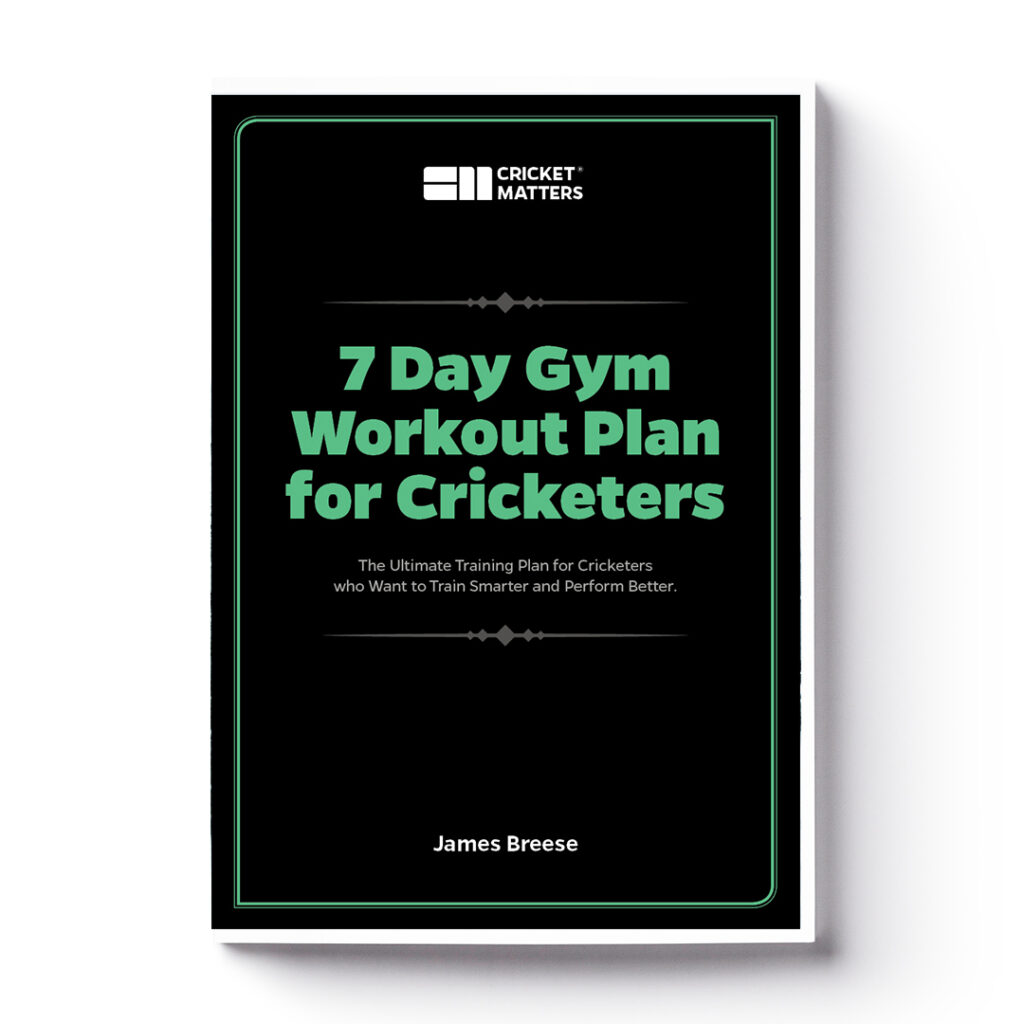
Have You Downloaded Our FREE 7-Day Gym Workout Plan?
Grab your complete step-by-step 7-day gym workout plan for cricketers today. There will be no more Guesswork. Just follow the plan and get results.
A Quick Guide to Macronutrients for Cricketers
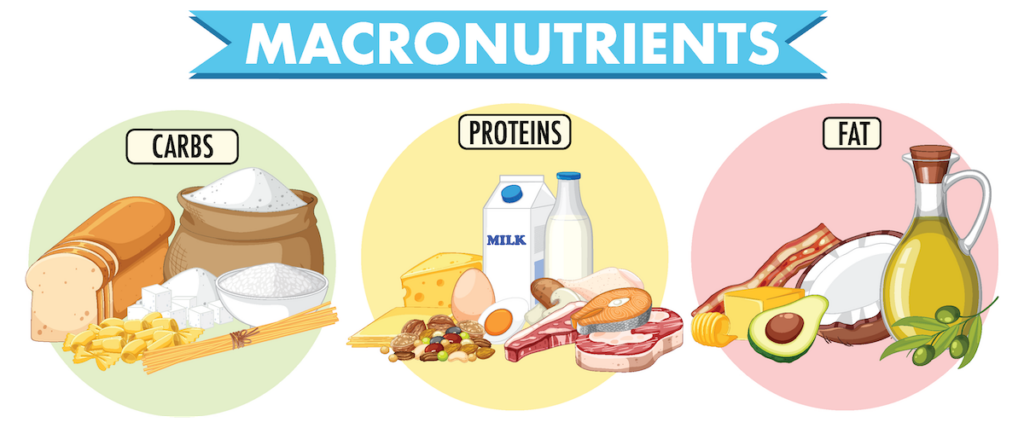
Understanding macronutrients—carbohydrates, proteins, and fats—is crucial for optimizing athletes’ performance, recovery, and overall health.
Each macronutrient plays a distinct role in fueling the body, repairing muscles, and maintaining energy levels.
Here’s a quick guide to help cricketers make the most of their nutrition:
Carbohydrates
- Function: Carbohydrates are the primary energy source for athletes. They are broken down into glucose, which fuels muscle contractions during exercise.
- Sources: Whole grains, fruits, vegetables, legumes, and sports drinks.
- Timing: Consuming carbs before and during exercise ensures sustained energy, while post-exercise carbs help replenish glycogen stores.
Proteins
- Function: Proteins are essential for muscle repair and growth. They provide amino acids necessary for tissue repair, making them vital for recovery.
- Sources: Lean meats, fish, eggs, dairy products, beans, and nuts.
- Timing: Post-exercise protein intake is crucial for muscle recovery. Including protein in every meal can support ongoing muscle maintenance and repair.
Fats
- Function: Fats are a concentrated energy source for hormone production and nutrient absorption. They also provide long-lasting energy for low to moderate-intensity activities.
- Sources: Avocados, nuts, seeds, olive oil, and fatty fish.
- Timing: While fats should be a part of an athlete’s daily diet, they should be consumed in moderation before exercise to avoid gastrointestinal discomfort.
Balancing these macronutrients according to training demands and individual needs can help athletes achieve peak performance and optimal health.
Understanding the roles and timing of carbohydrates, proteins, and fats allows athletes to fuel their bodies effectively and ensure they are ready to perform at their best.
A Quick Guide to Micronutrients for Cricketers
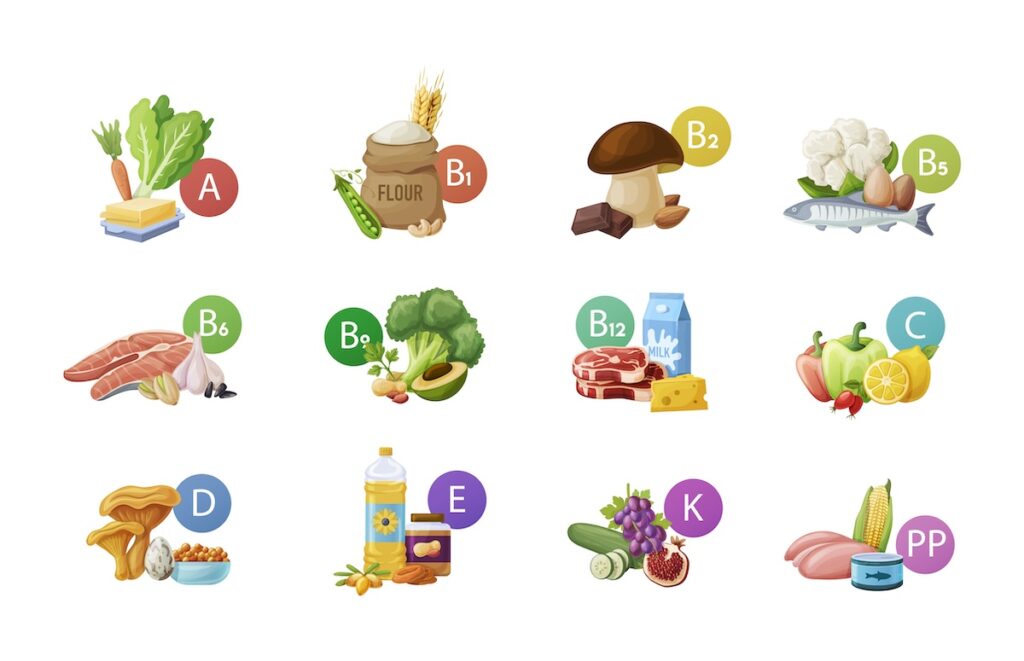
While macronutrients often take centre stage in an athlete’s diet, micronutrients—vitamins and minerals—are equally crucial for maintaining health and optimizing performance.
These nutrients support various physiological functions, from energy production to muscle contraction and immune defence.
Here’s a quick guide to some key micronutrients cricketers should focus on:
Iron
- Function: Iron is essential for oxygen transport in the blood and muscle function. It helps prevent fatigue and supports endurance.
- Sources: Red meat, poultry, fish, lentils, spinach, and fortified cereals.
- Importance: Athletes, especially females, should monitor iron levels to avoid anaemia and ensure optimal oxygen delivery during exercise.
Calcium
- Function: Calcium is crucial for bone health, muscle contractions, and nerve signalling. It helps prevent stress fractures and supports overall skeletal strength.
- Sources: Dairy products, leafy green vegetables, fortified plant-based milks, and almonds.
- Importance: Adequate calcium intake is essential for athletes to maintain bone density and reduce the risk of injury.
Vitamin D
- Function: Vitamin D aids calcium absorption, bone health, and immune function. It also supports muscle function.
- Sources: Sunlight exposure, fatty fish, fortified dairy products, and supplements.
- Importance: Ensuring sufficient vitamin D levels helps athletes maintain strong bones and immune health, especially during winter or for those with limited sun exposure.
Magnesium
- Function: Magnesium is involved in energy production, muscle contractions, and nerve function. It also helps regulate sleep and reduce muscle cramps.
- Sources: Nuts, seeds, whole grains, leafy greens, and legumes.
- Importance: Adequate magnesium intake can enhance athletic performance and recovery and support overall muscle health.
B Vitamins
- Function: B vitamins, including B6, B12, and folate, are vital for energy metabolism, red blood cell production, and reducing fatigue.
- Sources: Whole grains, meat, eggs, dairy products, and leafy green vegetables.
- Importance: B vitamins are crucial for energy production and overall vitality, helping athletes perform at their best.
Antioxidants (Vitamins C and E)
- Function: Antioxidants help protect cells from oxidative stress and support immune function.
- Sources: Fruits (especially berries), vegetables, nuts, and seeds.
- Importance: Consuming antioxidants helps athletes recover from intense exercise and reduces inflammation, promoting faster recovery and reducing injury risk.
Balancing these micronutrients in cricketers’ diets is key to supporting their training and match-day needs.
By focusing on a varied and nutrient-rich diet, cricketers can ensure they get the essential vitamins and minerals needed to stay healthy and perform at their peak.
What Should Cricketers Eat and Drink Pre-Match?

Ideally, cricketers should consume a balanced meal 2 to 4 hours before the start of the match.
This meal should be rich in carbohydrates to fuel high-intensity activities, include moderate protein to preserve muscle mass and support recovery, and contain healthy fats for sustained energy.
Here’s a comprehensive overview of pre-match nutrition for cricketers, with considerations for different match start times.
Overall Guidelines
Balanced Meal (2-4 Hours Before the Match):
- Carbohydrates: Essential for fueling intense physical activity.
- Protein: Supports muscle preservation and recovery.
- Healthy Fats: Provides sustained energy.
- Vegetables: Add essential vitamins, minerals, and fibre.
Therefore, a balanced pre-match meal might consist of the following:
- 1-2 palms of protein (e.g., chicken, fish, tofu)
- Equivalent in Grams: Approximately 100-200 grams
- 2-5 cupped handfuls of carbohydrates (e.g., rice, pasta, sweet potatoes)
- Equivalent in Grams: Approximately 100-250 grams (cooked weight)
- 1-2 thumbs of healthy fats (e.g., avocado, nuts, olive oil)
- Equivalent in Grams: Approximately 15-30 grams
- 1-2 fists of vegetables (e.g., spinach, broccoli, bell peppers)
- Equivalent in Grams: Approximately 100-200 grams
- Accompanied by a low-calorie beverage like water.
Small Meal or Snack (0-60 Minutes Before the Match):
For those who prefer a smaller meal closer to the match, a shake or smoothie is an excellent option for quick digestion and optimal performance.
- One scoop of protein powder
- Equivalent in Grams: Approximately 20-30 grams of protein
- 1-3 cupped handfuls of carbohydrates (e.g., banana, oats)
- Equivalent in Grams: Approximately 50-150 grams
- One thumb of healthy fats (e.g., almond butter)
- Equivalent in Grams: Approximately 15 grams
- One fist of vegetables (e.g., spinach)
- Equivalent in Grams: Approximately 100 grams
- 8 oz (250 mL) of water or a low-calorie liquid for blending.
Timing Considerations
- Morning Matches:
- Early Breakfast (3-4 Hours Before the Match):
- Example: Scrambled eggs with whole-grain toast, a serving of fruit, and a glass of milk.
- Pre-Match Snack (1 Hour Before the Match):
- Example: A banana with a small handful of nuts or a smoothie with protein powder, berries, and spinach.
- Early Breakfast (3-4 Hours Before the Match):
- Afternoon Matches:
- Lunch (3-4 Hours Before the Match):
- Example: Grilled chicken with quinoa, mixed vegetables, and a side of avocado.
- Pre-Match Snack (1 Hour Before the Match):
- Example: A whole-grain wrap with hummus and veggies or a yoghurt with granola and fruit.
- Lunch (3-4 Hours Before the Match):
- Evening Matches:
- Late Afternoon Meal (3-4 Hours Before the Match):
- Example: Salmon with brown rice, steamed broccoli, and a side salad.
- Pre-Match Snack (1 Hour Before the Match):
- Example: A piece of whole-grain toast with peanut butter and honey or a smoothie with protein powder, banana, and kale.
- Late Afternoon Meal (3-4 Hours Before the Match):
By tailoring their pre-match nutrition according to the time of day, cricketers can ensure they are adequately fueled, hydrated, and ready to perform at their best.
Remember, individual preferences and dietary needs may vary, so it’s important for each athlete to find what works best for them through trial and error during a season.
These are just examples provided. Dietary differences may vary; we’ll cover those in depth in other posts.
Further Reading
Optimal Hydration Strategies for Cricketers on Match Days

Proper hydration is a crucial yet often overlooked aspect of athletic performance.
Dehydration can significantly impair both physical and mental functions, leading to diminished performance and increased risk of health issues.
When athletes lose more than 1-2 percent of their body water, brain function decreases, endurance wanes, and strength and power drop.
This can happen after just one hour of exercise in the heat, underscoring the importance of maintaining adequate hydration levels on match days.
Daily Hydration Goals for Cricketers
Cricketers should aim for 3-4 litres of water daily.
Here’s a simple hydration strategy:
- Step 1: Drink a 1-litre water bottle during practices, workouts, and games.
- Step 2: Drink another 1-litre bottle of water immediately after practices, workouts, and games.
- Step 3: Consume 0.25-0.5 litres of water with each meal.
For essential hydration, plain water is sufficient.
However, for those training intensely and sweating profusely, adding a powdered sports or recovery drink can be beneficial to replenish electrolytes and carbohydrates lost through sweat.
Monitoring Hydration Levels
A straightforward way to monitor hydration status is by observing urine colour.
Light, pale yellow urine indicates good hydration, while darker urine suggests the need to drink more fluids.
Symptoms such as confusion, headache, fatigue, dizziness, and mood swings indicate dehydration, signalling the need for immediate rehydration.
Hydration Tactics for Practice, Workouts and Nets

What you eat or drink during activity should help maintain hydration, energy levels, and performance. The requirements vary based on the duration and intensity of the activity:
Practices, Workouts, and Nets Lasting Less Than 2 Hours:
- Focus on hydration with water. Sports drinks are generally unnecessary if a proper pre-event meal has been consumed. However, in hot conditions with excessive sweating, sports drinks can be beneficial to replenish electrolytes.
Practices, Workouts, and Nets Lasting More Than 2 Hours:
- Sports drinks that include protein and carbohydrates are advantageous for longer sessions. Consider the following hourly intake:
- During Practice/Workouts/Nets:
- 15 g protein (from essential amino acids powder or 1/2 scoop of protein powder)
- 30-45 g carbs (from 16-24 ounces or 0.5-0.75 litres of a sports drink)
- During Practice/Workouts/Nets:
By adhering to these guidelines, cricketers can remain well-hydrated, essential for maintaining elite performance and health on practice days.
Optimal hydration supports endurance, cognitive function, and overall physical performance, helping cricketers stay sharp and perform at their best throughout practice.
Remember, cricket is about making good decisions. Good decisions are a result of your hydration levels.
Hydration and Snacks Tactics During Matches

During matches, we have to ideally combine hydration and snacks to sustain energy levels, optimise performance, and maintain hydration during cricket matches.
Here’s how we believe cricketers can ensure they remain well-fueled and hydrated throughout the game:
Quick, Energy-Boosting Snacks
- Sports Gels: Provide a quick source of carbohydrates, are easily digestible, and can be consumed during breaks in play.
- Energy Bars: Compact and high in carbohydrates, they offer a convenient way to refuel muscles.
- Fruit: Bananas, apples, oranges are great natural options for quick energy and hydration.
Drinks: Electrolyte Replenishment
- Sports Drinks: These beverages are formulated to replace electrolytes lost through sweat, helping to prevent dehydration, muscle cramps, and early fatigue.
- Electrolyte Tablets or Powders: These can be added to water for a customizable electrolyte boost.
Shorter Formats (T20 Matches)
- Carbohydrate Intake: 20-30 grams of carbs from a gel or sports drink between innings is typically sufficient.
- Examples: One sports gel (usually contains around 20-25 grams of carbs) or 16-24 ounces (0.5-0.75 litres) of a carbohydrate-rich sports drink.
- Sports Drinks or Electrolytes in Water at every drink break
Longer Formats (40-Over and Multi-Day Matches)
- Carbohydrate Intake: 15-30 grams of carbs at each drink break and 30-90 grams of carbs between sessions to maintain glycogen stores.
- Examples:
- At each drink break: One bottle of water containing 15-30 grams of carbs of high energy carbohydrate drink.
- Between sessions: Two sports gels, a more extensive energy bar (30-60 grams of carbs), plus 30 grams from fruits or a carbohydrate drink.
- Examples:
5 Practical Tips for In-Match Hydration and Nutrition

- Regular Hydration: Drink small amounts of water or sports drinks regularly, aiming for about 0.1-0.25 litres every 15-20 minutes.
- Use Breaks Wisely: Utilize drink breaks to consume quick energy sources and replenish electrolytes.
- Monitor Hydration: Monitor urine colour and frequency to gauge hydration levels.
- Pre-Match Preparation: Drink 0.5-0.6 litres of water 2-3 hours before the match to ensure adequate hydration.
- Post-Match Recovery: Rehydrate with water or a recovery drink with electrolytes and carbohydrates. Consume a post-match meal or snack within 30 minutes of finishing the game to kickstart recovery.
This balanced approach to in-match nutrition ensures cricketers stay energized and hydrated and perform at their best.
What Should Cricketers Eat and Drink Post-Match?
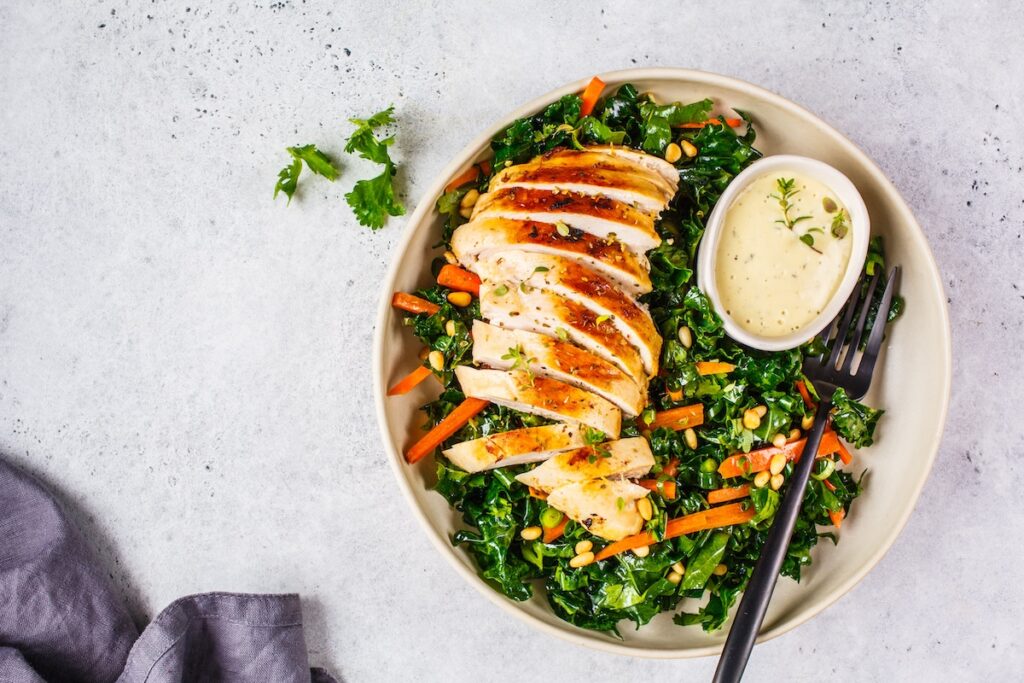
Post-match nutrition also plays a pivotal role in cricketers’ recovery process, significantly impacting their performance in subsequent practices, workouts, and games.
The critical two-hour window following a match or practice is when the body is most primed to replenish glycogen stores, repair muscle tissue, and rehydrate.
Failure to consume adequate nutrition during this timeframe can impede recovery, potentially leading to decreased energy levels, muscle fatigue, and increased risk of injury.
By prioritizing a balanced meal rich in protein, carbohydrates, fats, and vegetables, athletes can effectively refuel their bodies and support optimal recovery.
Liquid nutrition options, such as protein shakes, offer a convenient and easily digestible alternative for athletes who may not feel hungry immediately after a match.
Don’t neglect post-match recovery if you want to perform better, recover faster, and achieve long-term athletic success.
And no, technically, beer doesn’t count. If you score a hundred or take five wickets, buy your teammates a jug.
Food and Drink Suggestions for Post-Match Recovery
Here are some specific examples of food and drinks that are beneficial for replenishing energy stores and aiding muscle recovery after a match or intense physical activity:
1. Protein Sources:
- Grilled Chicken Breast: High in lean protein, it helps repair and build muscle tissue.
- Salmon or Tuna: Rich in protein and omega-3 fatty acids, reducing inflammation and supporting muscle recovery.
- Greek Yogurt: Contains high-quality protein and probiotics for gut health.
- Eggs: Versatile and rich in protein and essential amino acids.
- Plant-Based Proteins (Tofu or Tempeh): Good options for vegetarians and vegans, providing all essential amino acids.
2. Carbohydrate Sources:
- Brown Rice: Complex carbohydrate that replenishes glycogen stores.
- Quinoa: High in protein and fibre, it also helps replenish energy stores.
- Sweet Potatoes: Packed with vitamins and minerals, providing sustained energy.
- Whole Grain Bread or Pasta: Excellent sources of complex carbohydrates and fibre.
- Oatmeal: Provides a slow release of energy and can be paired with protein-rich toppings.
3. Healthy Fats Sources:
- Avocado: Rich in healthy monounsaturated fats and potassium.
- Nuts and Seeds (Almonds, Walnuts, Chia Seeds): Provide healthy fats, protein, and fibre.
- Olive Oil: Heart-healthy fat that can be used in salads or cooking.
- Fatty Fish (Salmon, Mackerel): Provides omega-3 fatty acids, which aid in reducing inflammation.
4. Vegetable Sources:
- Leafy Greens (Spinach, Kale): High in vitamins, minerals, and antioxidants.
- Broccoli: Rich in fibre, vitamins, and minerals.
- Bell Peppers: High in vitamin C and antioxidants.
- Carrots: Provide beta-carotene and fiber.
- Brussels Sprouts: Packed with vitamins, minerals, and antioxidants.
5. Hydration Sources:
- Water: Essential for rehydration and maintaining overall bodily functions.
- Sports Drinks: Containing electrolytes to replenish lost minerals and prevent dehydration.
- Coconut Water: Natural source of electrolytes and hydration.
- Chocolate Milk: Provides a good balance of carbohydrates, protein, and electrolytes, making it an effective recovery drink.
Practical Tips for Post-Match Recovery
- Timing: To maximize glycogen replenishment and muscle repair, aim to consume your recovery meal or snack within 30 minutes to 2 hours after the match.
- Hydration: Continue to drink water or an electrolyte-infused beverage to rehydrate effectively.
- Balanced Meals: Ensure that post-match meals include a combination of carbohydrates, protein, and healthy fats to provide comprehensive recovery support.
By incorporating these nutrient-rich foods and beverages into post-match meals or snacks, cricketers can effectively replenish energy stores, promote muscle recovery, and support overall performance and well-being.
This strategic approach to post-match nutrition ensures athletes stay energized, hydrated, and prepared for their next match.
5 Common Mistakes to Avoid on Match Days

Here are some of these pitfalls of what to eat and drink on match days for cricketers and some practical advice to avoid them:
1. Inadequate Hydration
- Mistake: Cricketers often overlook the importance of staying hydrated during matches, leading to decreased energy levels and impaired cognitive function.
- Solution: Prioritize hydration by drinking water consistently throughout the match. Consider bringing a water bottle and taking regular sips during breaks. Additionally, electrolyte-rich drinks should be incorporated if the conditions are particularly hot and humid.
2. Poor Pre-Match Nutrition
- Mistake: Failing to fuel properly before a match can leave cricketers feeling fatigued and lacking in energy.
- Solution: Ensure you consume a balanced meal containing carbohydrates, lean proteins, and healthy fats a few hours before the match to provide sustained energy. Opt for easily digestible foods such as whole grain toast with peanut butter and banana or a turkey and avocado wrap.
3. Overindulging in Sugary Snacks
- Mistake: While reaching for sugary snacks like energy bars or candy for a quick energy boost is tempting, these can lead to later energy crashes.
- Solution: Choose nutrient-dense snacks like fruit, nuts, or yoghurt to maintain steady energy levels throughout the match. For instance, a handful of almonds or an apple with a small portion of cheese can provide sustained energy.
4. Skipping Post-Match Recovery Nutrition
- Mistake: After the match, cricketers may neglect to refuel and replenish their energy stores, hindering muscle recovery and repair.
- Solution: Aim to consume a post-match snack or meal containing carbohydrates and protein within 30 minutes to an hour after the match. This could be a turkey sandwich with whole grain bread or a smoothie with Greek yoghurt and fruit.
5. Inadequate Rest and Recovery
- Mistake: Failing to prioritize rest and recovery post-match can prolong muscle soreness and increase the risk of injury.
- Solution: Ensure you get sufficient sleep and incorporate active recovery techniques such as stretching or foam rolling to aid in muscle recovery. Consider light yoga or a gentle walk to promote blood flow and muscle relaxation.
Practical Tips for Planning and Preparing Meals
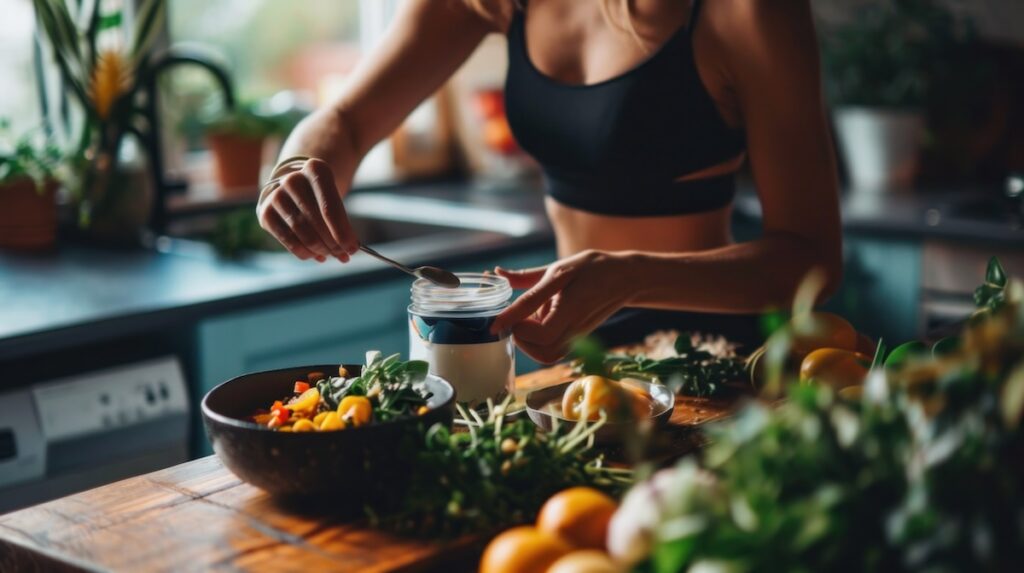
In addition to avoiding these recovery and dietary mistakes, proper meal planning and preparation can further enhance cricketers’ performance on match days.
Here are some practical tips:
Plan Ahead
- Preparation: Prepping nutritious meals and snacks in advance can save time and ensure you have access to healthy options. Examples include overnight oats with fruit for breakfast or a quinoa salad with grilled chicken for lunch.
- Snack Pack: Pack snacks like nuts, yogurt, and cut-up veggies to have on hand during breaks in the match.
Balanced Meals
- Pre-Match: A balanced meal a few hours before the match should include carbohydrates, proteins, and healthy fats. Examples:
- Whole grain toast with peanut butter and banana
- Turkey and avocado wrap
- Post-Match: Aim for a meal or snack rich in protein and carbohydrates. Examples:
- Turkey sandwich on whole grain bread
- Smoothie with Greek yoghurt, fruit, and a bit of honey
Hydration Strategy
- Consistent Intake: Drink small amounts of water regularly rather than large quantities at once. Carry a water bottle and sip throughout the day.
- Electrolytes: In hot conditions, supplement water intake with electrolyte drinks to replenish lost minerals and maintain hydration.
By proactively addressing these common pitfalls and implementing effective meal-planning strategies, cricketers can optimize their performance and recovery on match days.
Proper nutrition, hydration, and recovery practices are essential for maintaining energy levels, enhancing performance, and reducing the risk of injury.
Special Considerations: Dietary and Weather
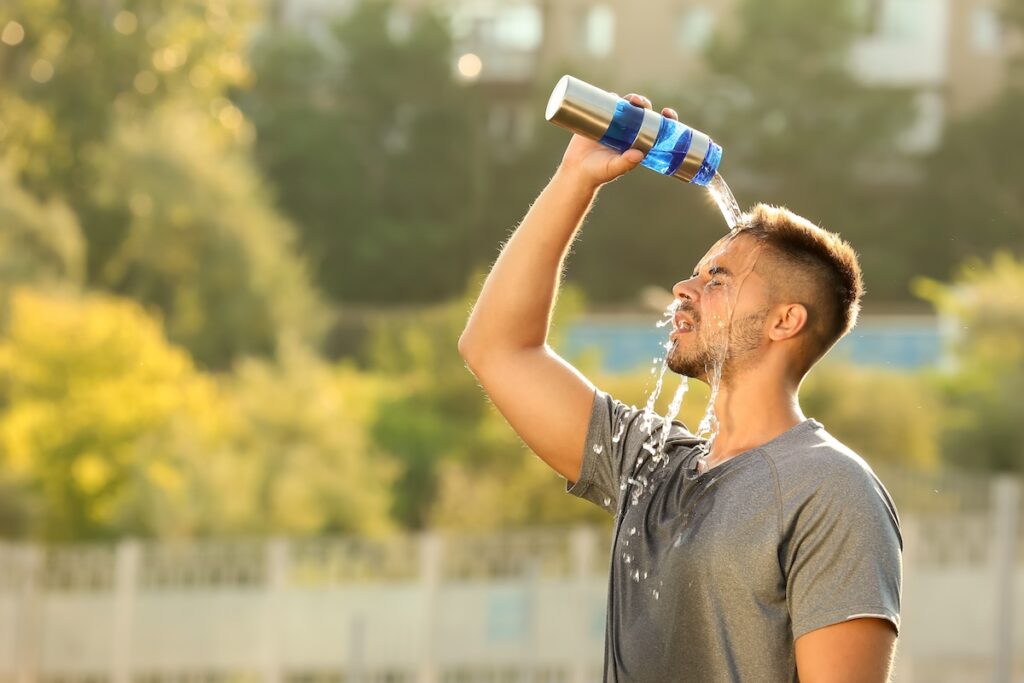
Addressing the dietary needs of cricketers with specific health considerations, such as diabetes or gluten intolerance, is essential for performance and overall well-being.
This isn’t an in-depth guide; however, we cover it briefly as this becomes a far more complex study.
Also, adjustments for different weather conditions (hot, humid, cold) are crucial to ensure optimal hydration and energy levels.
Dietary Needs for Cricketers with Specific Health Considerations
1. Diabetes
- Carbohydrate Management: Careful management of carbohydrate intake is paramount to regulate blood sugar levels and prevent fluctuations during matches.
- Low-Glycemic Index Carbohydrates: Opt for quinoa, sweet potatoes, and non-starchy vegetables to stabilize blood sugar levels and sustain energy.
- Balanced Meals: Incorporate lean protein sources like chicken, fish, and tofu, along with healthy fats from avocados and nuts, to control blood sugar and aid muscle recovery.
Example Meal Plan:
- Pre-Match: Grilled chicken with quinoa and steamed broccoli.
- In-Match Snack: An apple with a handful of almonds.
- Post-Match: Salmon with sweet potatoes and a side of spinach.
2. Gluten Intolerance or Celiac Disease
- Avoiding Gluten: To prevent digestive discomfort and other adverse reactions, cricketers with gluten intolerance or celiac disease must avoid gluten-containing grains like wheat, barley, and rye.
- Gluten-Free Alternatives: Opt for brown rice, gluten-free oats, and quinoa to ensure a well-balanced and nutritious diet.
- Food Log and Elimination Diet: Keep a food log and try an elimination diet to identify trigger foods and alleviate symptoms such as excess gas, bloating, diarrhoea, stomach cramping, fatigue, and skin rashes.
Example Meal Plan:
- Pre-Match: Gluten-free oats with berries and a spoonful of almond butter.
- In-Match Snack: A banana with gluten-free granola.
- Post-Match: Grilled tofu with brown rice and roasted vegetables.
3. Food Allergies and Sensitivities
- Identifying Triggers: Work closely with a registered dietitian or nutritionist to develop personalized meal plans that address specific dietary needs while optimizing performance.
- Elimination Diet: Identify and eliminate trigger foods to alleviate symptoms such as stomach cramping, fatigue, and skin rashes.
Nutritional Adjustments for Different Weather Conditions
1. Hot and Humid Conditions
- Increased Hydration: In hot and humid conditions, cricketers must increase their fluid intake to prevent dehydration and maintain performance.
- Electrolyte Replacement: Use sports drinks or electrolyte tablets to replace minerals lost through sweat.
- Light Meals: Opt for lighter, easily digestible meals that won’t weigh you down.
Example Adjustments:
- Hydration: Drink water regularly and supplement with electrolyte drinks during breaks.
- Snacks: Watermelon slices, cucumber sticks, and coconut water for hydration and refreshment.
2. Cold Conditions
- Warm Fluids: In cold conditions, maintaining hydration can be challenging, as the feeling of thirst is often diminished. Warm fluids like herbal teas or broths can help.
- Energy-Dense Foods: Include energy-dense foods to keep warm and maintain energy levels.
Example Adjustments:
- Hydration: Warm herbal tea or broth between innings.
- Snacks: Warm oatmeal with nuts and dried fruit or a thermos of vegetable soup.
By considering these special dietary needs and adjusting for different weather conditions, cricketers can ensure they remain well-fueled, hydrated, and ready to perform at their best.
Working closely with healthcare professionals to develop personalized nutrition plans can enhance your performance and overall health.
If you want help with one of our expert team members, please book a strategy call here.
Final Thoughts: What Cricketers Should Eat and Drink on Match Days
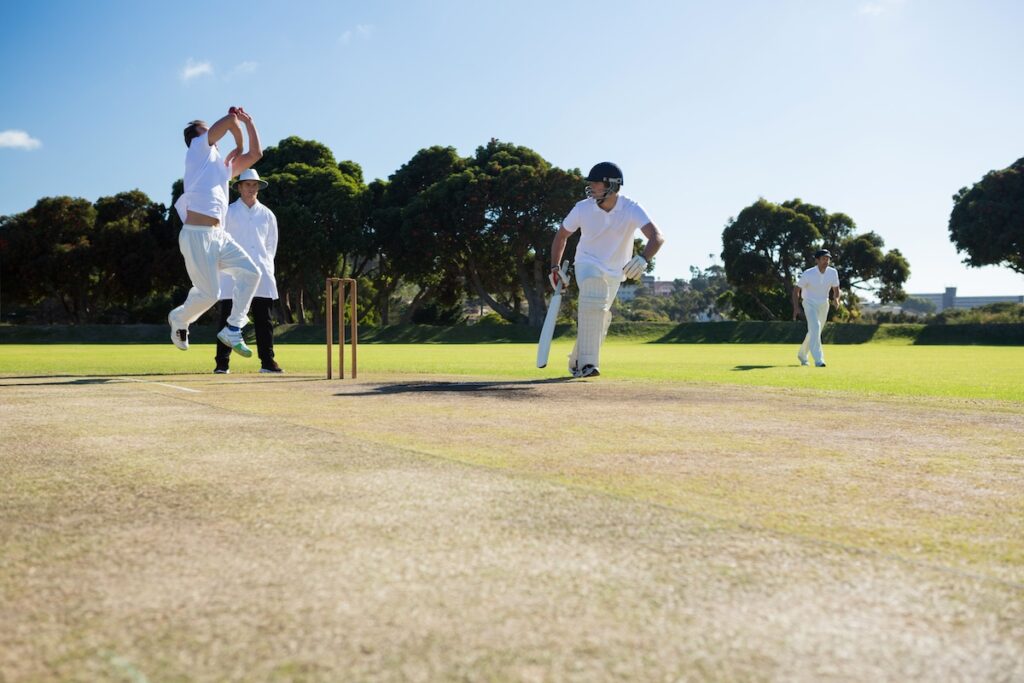
Optimal nutrition is crucial in maximizing performance and recovery on cricket match days.
Here are the key points to remember:
- Hydration is Key: Stay hydrated before, during, and after the match to maintain energy levels and cognitive function.
- Pre-Match Fueling: A few hours before the match, consume a balanced meal containing carbohydrates, proteins, and healthy fats to sustain energy.
- Smart Snacking: Choose nutrient-dense snacks like fruit, nuts, or yoghurt to maintain steady energy levels without experiencing energy crashes. Include sports gels for quick energy boosts.
- Post-Match Recovery: Refuel and replenish energy stores with a snack or meal containing carbohydrates and protein within 30 minutes to an hour after the match to support muscle recovery and repair.
- Prioritize Rest and Recovery: Get sufficient sleep and incorporate active recovery techniques like stretching or foam rolling to aid in muscle recovery and reduce the risk of injury.
- Meal Planning and Preparation: Plan and prep nutritious meals and snacks in advance to ensure you have the fuel you need on match days.
By following these guidelines and prioritizing optimal nutrition, cricketers can enhance their performance, support muscle recovery, and maintain overall health and well-being on match days.
Remember to adapt these guidelines based on personal experience and professional advice for the best results.
Further Reading
FAQs
What Should Cricketers Eat Before a Match?
Cricketers should eat a balanced meal 2 to 4 hours before the match to sustain energy, boost performance, and support recovery. This meal should be rich in carbohydrates, moderate in protein, and low in fat. Ideal options include grilled chicken with quinoa and mixed vegetables, baked salmon with sweet potatoes and steamed broccoli, or a turkey and brown rice stir-fry. For those who prefer a lighter meal closer to match time, a smoothie with protein powder, fruits, and vegetables is a good choice. Hydration with water or a low-calorie drink is also essential.
How Important Is Hydration for Cricketers on Match Days?
Hydration is crucial for cricketers on match days to maintain peak physical and cognitive performance. Proper hydration helps regulate body temperature, transport nutrients, and eliminate waste. Even slight dehydration can impair reaction times, concentration, and endurance. Cricketers should start hydrating the day before the match and continue drinking water or electrolyte drinks up to two hours before play, ensuring they stay hydrated throughout the match with regular fluid intake during breaks.
What Are the Best Snacks for Cricketers During a Match?
The best snacks for cricketers during a match are those that provide quick, easily digestible energy. Ideal options include sliced fruits like bananas and apples, energy bars, and a small handful of nuts or trail mix. These snacks help maintain blood sugar levels and provide a quick energy boost. Additionally, electrolyte drinks can replenish essential minerals lost through sweat, ensuring cricketers stay hydrated and energized throughout the game.
What Do Professional Cricketers Eat?
Professional cricketers follow a balanced diet tailored to support their intense training and match schedules. Their meals typically include a combination of lean proteins (such as chicken, fish, or tofu), complex carbohydrates (like whole grains, quinoa, or brown rice), and healthy fats (from avocados, nuts, and olive oil). They also incorporate plenty of fruits and vegetables for essential vitamins and minerals. Hydration is maintained with water and electrolyte drinks, and they often consume protein shakes or smoothies for recovery after matches.
What Are the Negative Effects of Poor Nutrition on Cricketers’ Performance?
Poor nutrition can significantly impair a cricketer’s performance, leading to early onset of fatigue, reduced concentration, and poor decision-making. Insufficient carbohydrate intake can deplete energy stores, while inadequate protein consumption slows muscle repair and growth, increasing injury risk. Dehydration can cause energy drop, impaired cognitive function, and slower reaction times. Additionally, lacking essential vitamins and minerals weakens the immune system, making players more susceptible to illness and disrupting their training and match performance.


